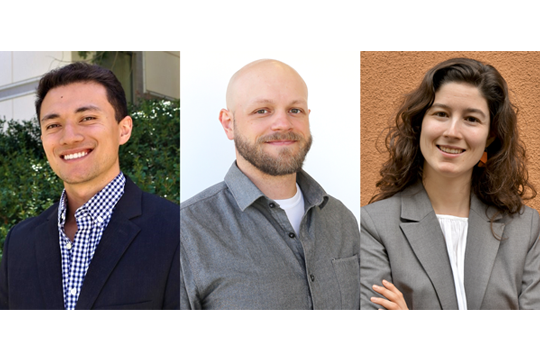Engineering Graduate Students Win 2021 Dissertation Fellowships

August 10, 2021 – The UC Irvine Graduate Division awarded dissertation fellowships to three engineering graduate students, Austin Lefebvre, Paul Marsh and Irene Martinez, for the 2021-22 academic year. This award is for doctoral or master’s degree students in their final year of graduate education, allowing them to forgo nonresearch-related employment and to concentrate on completing their dissertation or thesis.
Lefebvre, a biomedical engineering graduate student whose research focuses on understanding how cellular metabolism affects the spread of cancer, is working towards unveiling important therapeutic vulnerabilities that can be leveraged to specifically target metastatic cancer cells and prevent the spread and recurrence of even the most aggressive cancers. “It is already known just how dysregulated the metabolism becomes in primary tumor cells, but these processes during tumor invasion, and at secondary sites are still not well understood,” said Lefebvre. For his research, he is using a method to nondestructively and nonobtrusively monitor subcellular metabolic shifts within individual cancer cells in scaffolds made of materials with compositions and densities similar to native tissue. “I felt absolutely honored to have received this award,” said Lefebvre. “My research wouldn’t have been possible without the help of my wonderful mentor, Michelle Digman, and the brilliant ideas and help from my collaborators and lab mates.”
Electrical engineering and computer science graduate student Marsh is developing a method for inferring surface chemistry of liquid-contact pH sensors by water ions diffusion. If surface status can be inferred, users could then monitor and control the calibration of the sensor, long term, right at the sensing location. There would be no need for device removal, shipping to a lab, and hiring a staff scientist for analysis, because the device can check and calibrate itself on demand. “This award has allowed me to move fluidly through experimental steps,” said Marsh. “The summer funding has helped ensure I'll be prepared to finalize my thesis for my upcoming transition to DOE-funded national lab work."
Martinez, a graduate student in the Department of Civil & Environmental Engineering, aims to mitigate the phenomenon of traffic congestion. Her research is focused on modeling traffic jams and developing traffic management schemes both at individual bottlenecks and at the network level. She explores management schemes that can be implemented thanks to new technologies, such as connectivity and automation. “I have contributed to identify, formulate and solve the ‘optimal location problem’ of variable speed limits, a common management strategy to prevent traffic breakdown at bottlenecks,” said Martinez. “I showed that not only the design of the speed limit is important, but also where we place the variable message signs is key to prevent severe traffic congestion.” Martinez believes that modeling, improving and promoting shared and automated modes of transportation will lead to more equitable mobility and society.
– Megan Sosa
